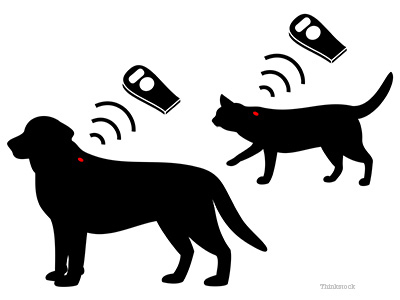Losing your pet can be a traumatic and even tragic event. Conscientious pet guardians protect their pets with collars and ID tags. Unfortunately, collars and ID tags are not foolproof and dogs and cats can still get lost. Collars can break or fall-off, leaving your beloved pet among the countless, unidentified lost strays at animal shelters. As a veterinarian who has worked at an animal shelter for over ten years and has witnessed this sad scenario replay day after day, I have come to realize that the true tragedy is the fact it can easily be prevented with the use of microchips.  What are microchips?
What are microchips?
Microchips are implantable computer chips that encode a unique identification number to help reunite you with your lost pet. They are no bigger than a grain of rice and they are placed under your pet’s skin with a needle and syringe, not much differently than a routine vaccine. Unlike collars and ID tags, they can never break or fall-off. They work by receiving a radio signal from a scanner and transmitting the encoded chip identification number back to the scanner. With the chip identification number in hand, the vital contact information is only a phone call away.
Not surprisingly, my experience at the animal shelter has made me a strong proponent of microchips. In addition to their tags and collars, all of my animals are chipped. Considering how easy it is to microchip your dog or cat, there is no excuse to not do so.
Studies support the importance of microchipping
Don’t take my word for it, a 2009 study by Linda Lord, DVM, PhD from the Ohio State University College of Veterinary Medicine supports what veterinarians and animal shelters have known all along. Dogs and cats with microchips are more likely to be returned to their owners than pets without. According to Science Daily, the study reported that cats with microchips were 20 times more likely to be returned home than cats without, while dogs with microchips were 2.5 times more likely to be returned home than those without. The results of this study underscore the importance of microchips.
The undeniable fact remains that microchips have reunited hundreds of pets with their guardians. Of course, in order for a microchip to work, you will need to register the microchip and keep your contact information up-to-date. Microchips are reliable and use nationwide registries, but they ultimately depend on the information that you give. So remember to update your information and provide multiple emergency contacts in case your pet gets lost while you are out of town.
Hopefully your pet will never get lost, but in case it happens, by making sure your pet has a microchip, you are giving yourself and your pet the best chance of a speedy, happy reunion. Just ask Spice, the 6-month-old grey and white cat discovered 2,300 miles away from her home. Thanks to her microchip, the shelter in Westbrook, Maine was able to identify her guardian in Albuquerque, New Mexico. Jon Ayers, former CEO of IDEXX Laboratories, and a dedicated cat lover, is working to get Spice back home.
If you have any questions or concerns, you should always visit or call your veterinarian -- they are your best resource to ensure the health and well-being of your pets.
